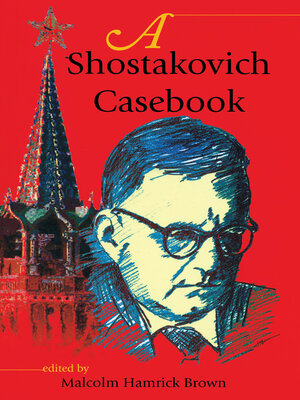
Sign up to save your library
With an OverDrive account, you can save your favorite libraries for at-a-glance information about availability. Find out more about OverDrive accounts.
Find this title in Libby, the library reading app by OverDrive.



Search for a digital library with this title
Title found at these libraries:
| Library Name | Distance |
|---|---|
| Loading... |
A collection of writings analyzing the controversial 1979 posthumous memoirs of the great Russian composer at their significance.
In 1979, the alleged memoirs of legendary composer Dmitry Shostakovich (1906–1975) were published as Testimony: The Memoirs of Dmitry Shostakovich As Related to and Edited by Solomon Volkov. Since its appearance, however, Testimony has been the focus of controversy in Shostakovich studies as doubts were raised concerning its authenticity and the role of its editor, Volkov, in creating the book.
A Shostakovich Casebook presents twenty-five essays, interviews, newspaper articles, and reviews—many newly available since the collapse of the Soviet Union—that review the "case" of Shostakovich. In addition to authoritatively reassessing Testimony's genesis and reception, the authors in this book address issues of political influence on musical creativity and the role of the artist within a totalitarian society. Internationally known contributors include Richard Taruskin, Laurel E. Fay, and Irina Antonovna Shostakovich, the composer's widow. This volume combines a balanced reconsideration of the Testimony controversy with an examination of what the controversy signifies for all music historians, performers, and thoughtful listeners.
Praise for A Shostakovich Casebook
"A major event . . . This Casebook is not only about Volkov's Testimony, it is about music old and new in the 20th century, about the cultural legacy of one of that century's most extravagant social experiments, and what we have to learn from them, not only what they ought to learn from us." —Caryl Emerson, Princeton University
In 1979, the alleged memoirs of legendary composer Dmitry Shostakovich (1906–1975) were published as Testimony: The Memoirs of Dmitry Shostakovich As Related to and Edited by Solomon Volkov. Since its appearance, however, Testimony has been the focus of controversy in Shostakovich studies as doubts were raised concerning its authenticity and the role of its editor, Volkov, in creating the book.
A Shostakovich Casebook presents twenty-five essays, interviews, newspaper articles, and reviews—many newly available since the collapse of the Soviet Union—that review the "case" of Shostakovich. In addition to authoritatively reassessing Testimony's genesis and reception, the authors in this book address issues of political influence on musical creativity and the role of the artist within a totalitarian society. Internationally known contributors include Richard Taruskin, Laurel E. Fay, and Irina Antonovna Shostakovich, the composer's widow. This volume combines a balanced reconsideration of the Testimony controversy with an examination of what the controversy signifies for all music historians, performers, and thoughtful listeners.
Praise for A Shostakovich Casebook
"A major event . . . This Casebook is not only about Volkov's Testimony, it is about music old and new in the 20th century, about the cultural legacy of one of that century's most extravagant social experiments, and what we have to learn from them, not only what they ought to learn from us." —Caryl Emerson, Princeton University







